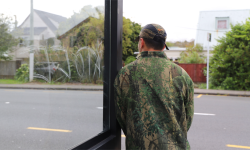[{"id":2423,"order":0,"imagePath":"https://admin.ezystream.com/static/images/article/2860f476-21c6-4370-b674-0751e34709ac.png","type":"image","content":"https://admin.ezystream.com/static/images/article/2860f476-21c6-4370-b674-0751e34709ac.png"},{"id":2424,"order":1,"contentText":"Whou2019s on your fridge? One of the things we (the Robinsons) have done as a family is sponsor a child in a developing country for every one of our children. As our family grew, so did the pictures of other peopleu2019s children on our fridge. We knew we would put so much love, concern and resources into our own offspring, so we felt we also wanted to make a difference for families who didnu2019t have the same advantages. Itu2019s great to know that because of us these children are supported and cared for by Christian charities like World Vision and Tearfund. But recently Iu2019ve been wondering about all the children that donu2019t have sponsorship. How can we work towards a safer and fairer world for all Godu2019s children?
In 1807, Great Britain passed the u201cSlave Trade Actu201d effectively outlawing the practice of slavery in the British Empire and setting a precedent that most other nations would eventually follow. The key leader of the twenty-year long campaign that led to the adoption of the act was an evangelical Christian, William Wilberforce, whose saw his political work as the outworking of his faith in Jesus Christ. Up to that point, many in British society had seen slavery as moral, necessary and economically beneficial. In fact, as history would show, they were wrong on all three counts.
Because of Wilberforce and the many other abolitionists of the 18th century and following, slavery is illegal in almost all countries of the world and is now globally recognised as a moral wrong and a breach of human rights. However, making something illegal does not necessarily stop it from happening. The sad truth is that an estimated 40.3 million people worldwide are subject to modern slavery (ILO estimate). While legal slavery is no longer a possibility, many are enslaved by illegal methods: for example, children are sold to work in brothels and factories; migrants workers have their documents taken; debtors are blackmailed; gangs threaten families if workers donu2019t comply; and corruption helps keep the criminals safe.
This has a moral impact upon us in Aotearoa New Zealand. Because of the sheer numbers of those caught up in slavery, our consumer products from overseas, like food, clothing and electronics, potentially involve slave labour at some point in their supply chain. Our cheap goods often come at the price of someone elseu2019s freedom, but up to now many companies have been able to deny this as they can maintain (or feign) ignorance of how their goods are produced. Are we okay with the idea that the things we buy in the shops are made by slaves while others profit from their oppression? The International Labour Organisation (ILO) estimates USD150 billion of illegal profits are made from slavery yearly, and these profits, of course, will go on to fund further illegal activity. Some of that money comes from our wallets u2013 it is surely time for Christians to pick up again where Wilberforce left off.
Right now, the New Zealand government is considering legislation that will make it a requirement for larger companies to take action if they become aware of slavery or other types of worker exploitation, and to require them to take due diligence to understand the supply chains they use and ensure those who work for their company directly and indirectly are treated fairly and not exploited against their will. As youu2019re no doubt aware, if we donu2019t get it right this time around, it will likely be years before another opportunity like this arises. This is why it is critical that people of Christian faith, who believe in the dignity of human beings made in Godu2019s image (Genesis 1:27), and the ideal of freedom granted to us by Christ (Galatians 5:1), make our voices heard and ensure that the government create legislation that goes beyond u201cvirtue signallingu201d and really creates change. In my opinion it is vital that companies are not allowed to turn a u201cblind eyeu201d and implicate us all in their disregard for human freedom, but should be expected to ensure the wellbeing of those who work for them and for their suppliers. To be effective I think there needs to be significant enforcement and deterrent punishment for offenders (both individuals and corporations). When there are real financial and legal consequences for companies who are complicit in slavery, attitudes and behaviour will change, just as they did after 1807.
Time is short, the deadline for submissions is 5pm on the 7th of June (2022). You can make a submission in less than five minutes by visiting wvnz.org.nz/submit-to-support Whatu2019s stopping you?
Of course, we canu2019t just rely on government legislation to change things. As consumers we have considerable clout, often more than we think. In the longer term, Iu2019ve realised I want to start being more intentional in my purchases as a consumer. Of course, I buy Fairtrade or ethical products when I get an easy option to do so, but how often do I seek that out? Once Iu2019ve made my submission, Iu2019m going to download and printout the Tearfund Ethical Fashion Guide (tearfund.org.nz/Get-Involved/Ethical-Fashion-Guide), because I need some new trousers for work. And maybe if I see some trousers I like, but they arenu2019t ethically made Iu2019ll email the brand to let them know why I didnu2019t buy. Itu2019s a small start I suppose, and I know many people are far ahead of me. So, what do you do? Iu2019d love to hear in the comments how you are helping make the world a place that more completely reflects the justice and kindness of God.
Jonathan Robinson is a Baptist pastor (Musselburgh Baptist Church, Dunedin) and Bible scholar (Otago University). A migrant Brit, heu2019s married to Rachel, a kiwi, and they have four kids, as well as an assortment of animals. He insists that the weather in Dunedin is u201cnot that badu201d, but is yet to find an Aucklander who will believe him.
References and more info
The New Zealand Ministry of Business, Innovation and Employment website contains information on the proposed legislation as well as a survey and other information about making a submission. mbie.govt.nz/have-your-say/modern-slavery
World Vision is a Christian charity which is advocating for this modern slavery law in New Zealand. They have an online form you can use to make your submission and examples of what you could say in your submission. worldvision.org.nz/causes/advocacy/support-modern-slavery-law
To read more about William Wilberforce you could start with this article: christianitytoday.com/history/people/activists/william-wilberforce
You may also be interested to read a different perspective, focussed on business concerns, from a New Zealand law firm: minterellison.co.nz/our-view/does-new-zealand-need-a-modern-slavery-act
","type":"text"}] Who’s on your fridge? A crucial moment to act
Education
Effective Mission, Growing Disciples | Otago Southland | Jonathan Robinson | 25 May 2022
- Syntax error, malformed JSON
Read More Articles
Register now for Hui ā Māori 2024: ‘no greater time to be unified’
A call for Baptist Māori to engage with the significant kōrero coming to Hui ā Māori 2024.
Reflections on the season of Matariki
Three Baptist Māori share what they’ll be doing to acknowledge this season.
Are our social support services making a difference?
Transactional or transformational support: what services should our local church aim for to empower our communities?


